A favorite story of mine I 'wrote' a while back. Though I didn't write it with Beltaine in mind, it seems appropriate. Enjoy!
*****
He begins:
"Once there was a girl so beautiful the lilies hung their heads in shame; though the roses, who were the jealous type, turned theirs aside and pretended not to see. But this girl, as beautiful as she was, had absolutely no idea of it; for she had grown up alone and poor and mirrorless, and no one had ever been there to tell her so. But that was part of the nature of her beauty, for it was a defiant kind that thrives in spite of hardship and neglect, like the flower that forces its way through a crack in the paving to bloom lush and fragrant.
"And so she lived alone, as she always had since she was a child, when she had lost her mother; and she looked after her garden and tended her hens and did all right, really. But she did not mingle much with other people.
"Though every week or so she would go to the market, a couple hours' walk from her home; and there she would sell some eggs, or some vegetables if she could spare them, and pick up the few things she needed but could not grow herself. And though she might have gotten a pretty penny for them, still she never could bear to pick the lilies or the roses.
"And so this day she gathered up a basketful of eggs, and put on her old indigo dress, the one that had once been deep blue but had faded; and she set off for the market.
"Now, this time she had gotten a bit of a late start, and so she hurried more than usual, worried that she might miss the ribbon-peddler, for she needed a new needle; and she was paying less attention than she might have.
"And so she missed the turn by the hawthorn thicket, by the bend in the road; but, still, she wasn't all that addled, and after a few yards' walking she realized her mistake and turned back to go the right way.
"And then she heard the singing.
"It was coming from within the thicket, that old hawthorn thicket she'd seen countless times on her tos and fros from the marketplace; and looking closely between the tangled branches she realized there was a house in there, one she had never before noticed.
"And it came to her that because she had been running late she had left without eating; and she was suddenly quite hungry, and quite thirsty too, for she had brought no water with her.
"And so she stepped into the circle of hawthorn trees, and was lost to this world.
"Now, in that house lived a man, a man of the Shee; and he had been the one she had heard singing. And when he heard the knock on his door he was greatly puzzled; for who of mortals had ever even been able to see his home?
"He was so surprised by this he did not stop to think, and so simply opened the door, curious.
"And there before him was a beautiful, beautiful woman, in a gown the color of the sky of early springtime; and he could see immediately that her physical beauty, though considerable, was not the reason the lilies had hung their heads. For she had a strength to her that ran beyond beauty, though it had created it; and looking on her his heart was lost.
"For her part she saw the door opened by an old man with skin as smooth and brown as a hazelnut, one whose look of mischievous amusement soon turned to naked wonder; but looking in his eyes she could see there was a glamour on him.
"'I am Koeroc,' he said then, giving her his true name without thinking; and as he said it she saw him as he was, a man tall and beautiful as only the Shee are; and she knew, also, what his name meant: Hidden Heart.
"Yet she could also see that the name was suddenly no longer true. 'You are my Beloved,' she said simply, as she drew him into her arms; for her heart, too, was lost.
"And so she clear forgot about the marketplace that day, and the next, and the next; and the two of them passed their time as lovers do, though perhaps with a larger proportion of ecstasy than most; the Shee, you know, are very skilled in these matters, so they say.
"But after a few days she remembered her garden, and her hens, shut in their house with a dwindling supply of feed; 'I must tend to them,' she told him, 'They are in my care.'
"But then, 'How long has it been?' she asked, worried, for she knew that time flows differently with the Shee.
"'They are well,' he said, 'It has not been long.'
"'I must go,' she said sadly, though she knew she would be back.
"'Yes,' he said, though he was worried that she would not; and a fear grew inside him then, one borne of his experience with glamour. 'You will forget me.'
"Well, her look put the lie to that.
"And so she made ready to leave; but as she came to the hawthorn circle he said, 'Wait.'
"And she stopped, and turned to him.
"And with the middle finger of his right hand he thrice traced a circle on her forehead, then leaning in kissed the spot; and she felt something cast about her, light but warm, like a silken scarf.
"'There,' he said, 'you are marked as protected.'
"She nodded, and stepped out from the hawthorn trees.
"It was colder than she remembered, and darker; but the way was not far, after all, and she was soon home. Once there she found the hens had eaten nearly all their feed, and were quite grateful to be let out; and the garden had a few weeds, though they were easily seen to. And as she picked the vegetables she thought she would like to bring some back with her to share with him; and also that she should gather up some clothes. Though really, she thought with a smile, she had not had much need of them with him; and distracted by that fond memory she entirely failed to see the new hole that had appeared in the path, dug by some critter after her carrots no doubt. But said hole made itself suddenly quite known to her, as she caught her foot in it and fell over into the dirt with a lurch; and as she fell she heard a rather nasty crunch, coming from her ankle.
"'Christ!' she said, quite out loud, 'what's with the damned human crap?'
"And then she reeled a bit as her eyes filled with tears, for it hurt quite a lot; but after a good cry she was able to examine it, gingerly. And it was not broken, that she could see; but it was quite badly sprained.
"'Fuck, fuck, FUCK!' she cried then, for she knew she would just be able to manage the bare minimum of care for herself and her chickens; but there would be no way she could make it back to the hawthorn thicket. And no way to send a message, either, for she did not have any neighbors.
"And so for the next few days she stayed off her ankle as best she could, and tried to take care of herself and get plenty of rest, in the hopes that it would heal quickly; but it was an agonizingly slow business. And she despaired, for she knew time flowed differently for the Shee.
"But after a few days there came a knock on her door, which was quite unusual; in fact she did not recall ever having heard one. And her heart leapt; for someone was here, someone who could perhaps take a message to him; and so she hobbled slowly but with determination to the door.
"And when she opened it she saw an old peddler-woman; but she knew his true name, and could not be fooled. 'Oh, Love,' she said, 'I am hurt and cannot walk.'
"'Ah,' he said, his fear and confusion vanishing with his disguise; then seeing her ankle, 'Oh.'
"And he helped her back to her chair by the window. And he knelt beside her, and gently put his hands upon her poor, swollen ankle, and he began to sing. And she felt the torn tendons knit themselves together and become strong again; and though it would still need a few more days, it was much, much better, for such is the magic of the Shee.
"'Oh,' she said, 'I'm sorry.'
"'Shhh,' he said, 'I am here now.'
"And he looked around at her little, poor cottage, which did not even have a mirror.
"'I will stay,' he said, though he was a little afraid; and she nodded.
"And he did, and they thrived; and a circle of hawthorn grew around the yard, though no one had planted it. And though they certainly made a lot of love they remained childless, which suited them; and in time she grew old, though she was no less beautiful. But he remained young, or young-looking; for time flows differently for the Shee.
"And her life ran down towards death, as it is with mortals; and he sat with her by their bed, and held her hand between his. And he looked on her, as the light in her eyes faded and became further away.
"'I am sorry," she said, her voice only a whisper.
"'Shhh,' he said as she died, 'I am here.'"
He stops then, falling silent.
"Oh," I say, "that's very sad."
"Shhh," he says quietly, "it is not finished." And he continues:
"And then she found herself standing up in a place of light, in a body suddenly strong; and the many dull aches she had grown used to with age had now vanished. And looking down at herself she saw that she was young again, as young as the day they had met. And there he was before her, smiling at her, and holding her hand between his still.
"'Oh,' she said, in great joy.
"'Yes,' he said, 'I am here.' And he took her into his arms, and kissed her hair.
"For that is the nature of the Shee, that they live in both this world and the Other."
He pauses again, before quietly saying, "The end."
Friday, April 30, 2010
Merry Blessed Rutty Beltaine
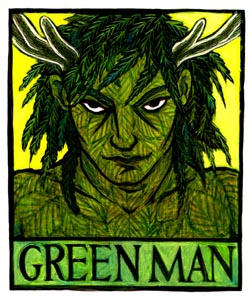
Riffing off of Ruby Sara's most recent post over at Pagan Godspell, here's a bit of art I did a while back whilst listening over and over to the song she quotes, Greenman by XTC, as perfect a Maypole-dancing song as I have ever heard (and I have, in fact, danced a Maypole to it). No matter how many times I hear that song, the opening swell still pins my heart chakra open wide. So glorious. So beautiful. So daimonic.
So there's my Green Man, in springtime antlers, covered with that fuzzy velvet which covers the antlers as they grow, and provides nutrients and blood. I imagine they are very sensitive in that state, and that they throb.
Merry merry blessings of May to all of us!
Monday, April 26, 2010
Goddess of the Week
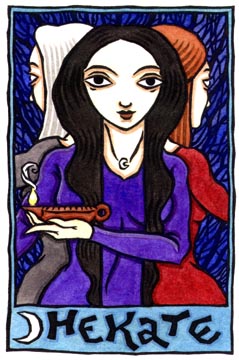
Hekate last came up eleven months ago, in full riot of May. I have to admit that I find it strange that a Goddess of the Dark should keep coming up in Spring. Last time She spoke of tempering the light and growth with a little bit of darkness; it is good, I suppose, to remember that the light grows from the darkness, as the flowers of spring grow out of the dark earth. All that has come before us, the visions, the dark times, our Underworld journeys, have contributed to the glory we create and we are.
Hekate is a Greek Goddess, said to be of Thrakian origin (parts of modern Greece, Bulgaria and Turkey). She is a Titaness, one of the older race of Deities, the daughter of Asteria ('Starry One') and Perses ('Destroyer'). Sometimes Nyx, the Goddess of night, is said to be Her mother instead of Asteria; at any rate She is associated with the night sky.
In the war against the Titanes She is said to have sided with the Olympian Deities; this is the reason given for why, after the Titanes were overthrown, She was still given honors by Zeus, Who allowed Her to keep Her power over the realms of sea, sky, and earth (including that under the earth). I mean, that's the spin that's been put on it, anyway. The Titanes were said to have been cast into Tartaros, the Underworld; but as that was one of Hekate's realms already, how should casting Her there take away Her power? So I have my doubts.
At any rate Hekate always maintained a certain independence, an apartness from the other Deities; when Kore was taken away to the Underworld, few save Hekate helped Demeter in Her search. They were all too afraid of Zeus.
Hekate is associated with the Moon, especially the dark Moon; and She was said in late times to be an eerie sort, walking the night trailing spectral hounds and ghosts. She is a Goddess of witchcraft and the night, of herbs and spells. She is also accorded a psychopomp, one Who guides the soul to the Underworld, much as Hermes does, and in fact She is occasionally said to be His consort, in His guise as Hermes Khthonios, Hermes of the Underworld.
But She also leads the soul out of the Underworld. For though Kore must spend part of the year in the Underworld as Queen Persephone, Hekate remains with Her as minister and adviser. And when the Maiden returns to the upper world to be greeted by the full glory of Spring, Hekate brings Her forth into the light.
She is also the Goddess of crossroads, especially those where three roads meet, and She was given offerings at little shrines at some of them; and She is said, also, to protect the lonely traveler on dark roads. Which is why I think I have always found Her somewhat comforting, though it is very much at odds with Her ghosty reputation. But choices, and the path trodden, and being able to see in the dark: that is what Hekate is about.
So, this week's theme then is that of dark journeys that lead to the light. Where are you on that journey? Are you still in the dark on that lonely road, or have you come out into the Spring and warmth? How has that journey shaped your experience of the light? How has it created or given birth to the light? How have you changed?
And what turnings has that, is that, journey taken or taking? What crossroads have you, do you, face? Where three roads meet, remember there are two choices forward, and always, one choice back.
What does She say?
Firm your feet on the ground. In the stillness of night the wind dies down. Listen now. Scent the air. Be not afraid. I am here, and you are with me. We are akin, you and I, if you call yourself Witch; I will guide and protect. Call on me and I will help you.
Now look. What else is with you in the dark? You bring something with you, always. That may be good or bad, depending on what it is. Look.
But know that to be reborn you must always die first. The serpent sheds Her skin; do you think this is painless? It is hard, it is always hard. This is as it must be. But I am here, and I am a Guide in the place between.
Where do you wish to go?
References: the ever-excellent Theoi, of course.
Monday, April 19, 2010
Goddess of the Week
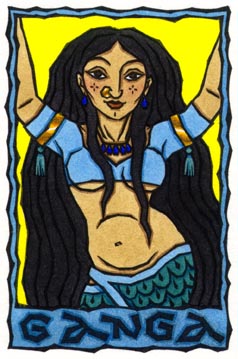
And we're back to water, aren't we?
This is the first time Ganga, the Hindu Goddess of the sacred Ganges River, has come up. She is the personification of the Ganges River; I say 'personification', because, though She is certainly a Goddess, in the case of the Ganges the river itself is the primary image, the human form secondary.
In the Hindu tradition, rivers are sacred, and said to originate in the heavens; and they are a link between the divine world and this one. They are associated with purity, as running water is believed to have great powers of cleansing, both of the ordinary and the spiritual kind. The Ganges, especially, is revered for Her ability to cleanse even the worst pollution.
Ganga the Goddess can be depicted in both human form, or as half-fish, like a mermaid; or She is shown with rivulets of water flowing to both sides of Her. She was sometimes depicted flanking the doorway to temples with another river Goddess such as Yamuna, Goddess of the river of the same name; They can be seen as ritually purifying all who enter into the temple.
So this week then is about the flow of the divine into this world through the medium of, well, you. How can you open up to it? What is the source? The Ganges River originates ultimately in the melting glaciers of the Himalayas; how are the stored snows of winter, the visions and the time of rest you have come out of recently, now flowing? What do they bring with them?
It is also about purification, both spiritual and physical. What needs to be cleansed? Sadly, though the Ganges is spiritually very pure, in physical reality it is one of the most egregiously polluted rivers in the world. What physical actions can you take to cleanse not just your body, but the environment around you? Earth Day is coming up this week--though we Pagans know that Earth Day is really every day, consider doing something this week to clean your local area, if you can manage. You live there, after all.
What does She say?
I dance. I flow. I am always moving, always cleansing, always sweeping away your pollution. Where do you think it goes? Quite a metaphor, isn't it? That I come from heaven, and connect the worlds, and purify, and am yet filthy. This is not my fault. Look to yourselves. And stop it. Even a loving Mother will lose patience with Her children.
Oh, and drink your water. It's good for you.
References:
Hindu Goddesses, by David R. Kinsley
Hindu Myths, translated by Wendy Doniger O'Flaherty
Monday, April 12, 2010
Goddess of the Week
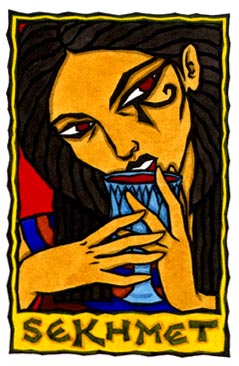
This is Sekhmet's second appearance so far; She last came up more than a year ago, in December 2008. She is one of Egypt's lioness Goddesses, and represents the fierce heat of the Sun.
Her name means 'the Powerful One' or 'the Violent One'; She is also called Nesert, 'Flame.' She is part of a triad of Deities centered on the city of Memphis, with Ptah, Her husband, a creator God and patron God of craftsmen, and Their son Nefertum, the Sun as the emerging lotus blossom.
I wrote about Her usual legend, in which She is an instrument of revenge against humankind, in the earlier post; in addition to Her ferocious and bloodthirsty ways, consonant with Her form as a lioness, She is also considered a bringer of plague or disease, especially fevers, since She is associated with fire and the Sun.
Which of course then connects Her with healing, since a Goddess Who brings disease can also prevent it--if She may be prevailed upon, that is. And in fact Her priests practiced healing magic and medicine, such that the title 'Priest of Sekhmet' came to mean 'doctor.'
In Late Period Egypt, the deified human Imhotep was adopted as Ptah's son. Though in real life he had been a vizier and architect, the one who designed Djoser's Step Pyramid, as a God Imhotep was known for His great healing powers, such that the Greeks associated Him with their Asklepios. Though not said to be Sekhmet's son, Her association with healing and medicine may well have played a part in His adoption into that family of Deities.
This week then, I think the theme of healing will continue; though of an altogether different sort--for last week was healing through water, while this week is through fire. I think, also, it will be more about casting out the bad than invoking the good, if that makes sense. At any rate the former must be done first to make room for the latter.
Or it could be that last week was about soothing rest, while this week will be about getting your energy back. Or that last week was about working with the flow of things, while this week is about kindling your own fires and taking the initiative. How would you interpret the switch from water to fire?
Let's see what She says:
Fire, fire, fire. Beat down the sun I wade in blood up to my knees, the blasphemers, the liars, the slanderers, all cut down before me, before my red red rage. Red for fire, red for blood. It is in the blood, the fire. Red, it is red now!
I don't know that I am a healer, or maybe it doesn't matter. What matters is my power over that which harms. I choose. It is up to me.
It is up to you, too, for you have this power as well. Remember that!
What do you think? How do you think we can be healed by fire?
References:
Ancient Egypt, by Lorna Oakes and Lucia Gahlin
The Atlas of Ancient Egypt, by John Baines and Jaromír Málek
Thursday, April 8, 2010
New Art of Kybele
I am in the middle of rethinking what I want to do with that Goddess deck of mine. I mean, not to worry, I still plan to publish, finish the book, &c; but lately I've been looking at the thing as a whole, trying to bring it into some kind of balance. To that end I've decided to swap a few cards out, mostly the monotheistic sorts, to make room for some other Goddesses. First one so far: I'm switching the Black Virgin out, and replacing her with Kybele. Here She is:
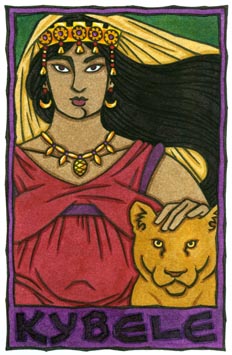
My version of the Black Virgin had strong elements of Kybele anyway, but I think I'd rather have the real thing. I did most of this last week sometime, then put it down, not sure if I liked it; but tonight I went back in and finished it, tweaking the colors and putting in those darker outliney sort of shadows. It's amazing to me how those little shadows always make the thing look dramatically better. It's exponential, I swear.
So, this Kybele (I'm using the Greek spelling rather than the Roman 'Cybele') is sort of a combination of the Roman imagery, which usually shows Her enthroned with a lion, and the very very very ancient and startlingly similar image of the Neolithic Goddess from Çatal Höyük (from, seriously, 6000-5500 BCE), thus:

(Image from Wikipedia, by one Roweromaniak)
I do like Her (and I like Her more the longer it goes), but I'm not sure if She's quite rattle rattle BOOM!! enough. It's a little weird; Kybele has a reputation for wildness, but all the statues of Her (the Roman ones, anyway) are very staid and proper looking, with the stately pose, the throne, and the mural crown. So it's a little tricky.
Still, I think I do like Her.
And, oh yes, a pine cone for Attis.

My version of the Black Virgin had strong elements of Kybele anyway, but I think I'd rather have the real thing. I did most of this last week sometime, then put it down, not sure if I liked it; but tonight I went back in and finished it, tweaking the colors and putting in those darker outliney sort of shadows. It's amazing to me how those little shadows always make the thing look dramatically better. It's exponential, I swear.
So, this Kybele (I'm using the Greek spelling rather than the Roman 'Cybele') is sort of a combination of the Roman imagery, which usually shows Her enthroned with a lion, and the very very very ancient and startlingly similar image of the Neolithic Goddess from Çatal Höyük (from, seriously, 6000-5500 BCE), thus:

(Image from Wikipedia, by one Roweromaniak)
I do like Her (and I like Her more the longer it goes), but I'm not sure if She's quite rattle rattle BOOM!! enough. It's a little weird; Kybele has a reputation for wildness, but all the statues of Her (the Roman ones, anyway) are very staid and proper looking, with the stately pose, the throne, and the mural crown. So it's a little tricky.
Still, I think I do like Her.
And, oh yes, a pine cone for Attis.
Wednesday, April 7, 2010
Update
Well, the bridge on my street may be open, if only in a jerry-rigged and temporary way, but the one in the last post with the historic triple-arch (built in 1822, with no mortar!) I just found out is closed indefinitely. Which makes getting across town, to, say, the dump (sorry, 'recycling center') to pick up compost for the garden a real pain in the ass; the quickest detour makes the journey (usually a mile and a quarter) at least five or six miles. Not fun. Another old bridge, hard by a dam that was threatening to let out, is also out of commission, as one of the slabs shifted and collapsed, leaving a rather large gap. And today they announced that a third bridge has been closed, over on the other side of town.
As a selectman said, my town is now a place 'where you can't get there from here.'
Oy.
As a selectman said, my town is now a place 'where you can't get there from here.'
Oy.
Monday, April 5, 2010
Goddess of the Week

Diana comes up for the second time since I've been pulling these; the last time was just over six months ago in the middle of September.
Diana is originally a Latin Goddess, Who was taken up in time into Roman beliefs; Her cult was centered in a lake in the Alban Hills in Aricia, not far southeast of Rome itself. There She had a shrine on the shores of the near-circular lake, located dramatically in the crater of an extinct volcano; the lake itself called the speculum Dianae, or the Mirror of Diana.
Since Diana was equated with the Greek Artemis from very early times, it is hard to separate out the original Diana; but, like Artemis, She is a Goddess of women, the moon, the wild, and healing. Many many votive deposits, given to petition for healing and health, were found at Her shrine on the lake.
I have shown Her here as Diana of the Witches, a (more or less) medieval concept of Diana, but the frog She holds is understood to be symbolic of healing and of transformation. Through water, I am tempted to say, but I may just have water on the mind; through something witchy and dark and female, at any rate.
So then this week is about healing and transformation, through channels of a 'feminine' sort, for example through the unconscious mind, say via dreams or night visions. The Moon wanes down to nothing this week, down to the dark and the still point. It is a good time for visions.
I'll tell you this past week I have become much more aware of the paths of the rivers and brooks in my town, and how they are far more enduring and powerful than the paths we humans have laid down. It is a humbling perspective, and a profound shift in thinking, to see the network of water as primary. How can you shift your own perspective in a similar way? (Without, of course, a minor natural disaster to help things along!)
Rereading this post I am struck by the words 'center' and 'circular'; take that as advice to be especially mindful of centering and grounding at this time. Go within for a time this week and find your center in the quiet and the dark.
What does She say?
Heal yourself. Put your power forth and direct the light to your own hurts. Do this first or you will do nothing else. Right now. It is a very good time for self-healing.
Find that undercurrent, that hidden strand. It knows what you need to be healed. Find it and listen to it, then act. Draw down the Moon, the light, My light, into yourself; focus it within.
And above all trust yourself. Trust that you cannot hurt yourself in healing yourself. Trust that you will take exactly what you want and need. Trust that you know how to heal, and what to do to be healed. This is the perfect time. Right now.
What do you think?
Subscribe to:
Posts (Atom)
